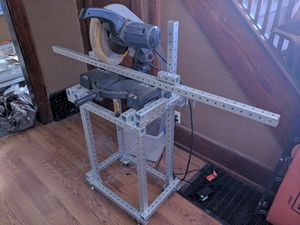Tool stands: Difference between revisions
From
No edit summary |
No edit summary |
||
| Line 1: | Line 1: | ||
{{Projects infobox | {{Projects infobox | ||
|image | |image = Sawstand.jpg | ||
|designer | |designer = [[User:Ben|Ben Johnson]] | ||
|date | |date = 2019 | ||
|vitamins = | |vitamins = | ||
|materials = | |materials = | ||
|transformations = | |transformations = | ||
|lifecycles = | |lifecycles = | ||
|tools | |tools = [[Wrenches]] | ||
|parts | |parts = [[Frames]], [[Nuts]], [[Bolts]], [[Plates]], [[End caps]], [[Washers]] | ||
|techniques | |techniques = [[Shelf joints]], [[Tri joints]], [[Odd parts first]], [[Stacked washers]] | ||
|stl | |stl = | ||
|git | |git = | ||
}} | }} | ||
Revision as of 12:23, 26 May 2021
Project: Tool stands
| Tools: | Wrenches |
|---|---|
| Parts: | Frames, Nuts, Bolts, Plates, End caps, Washers |
| Techniques: | Shelf joints, Tri joints, Odd parts first, Stacked washers |
Introduction
Challenges
Planing, ripping, or otherwise processing long wood, metal, or plastic raw materials requires supporting those materials along their length during processing.





